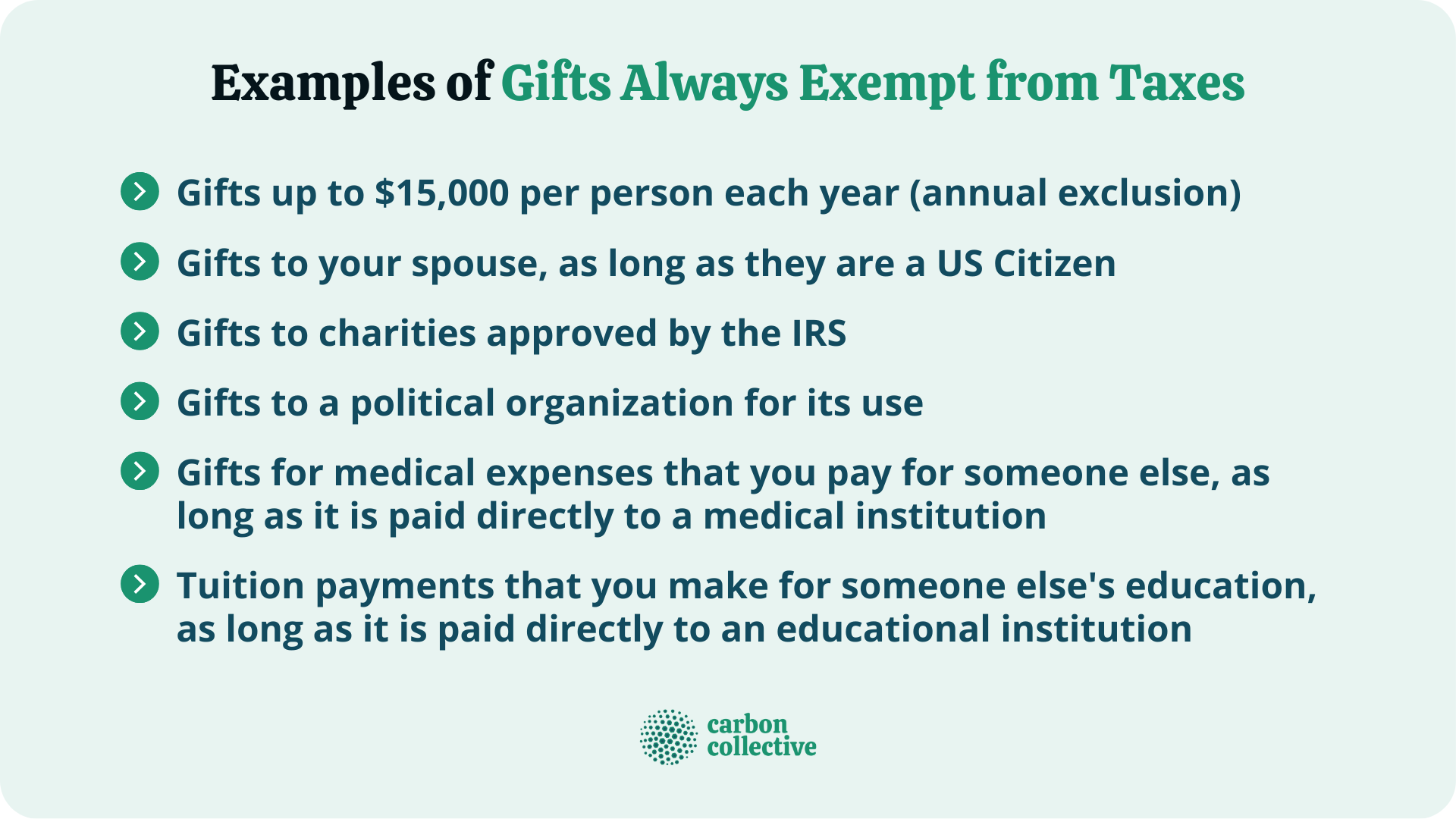What Is Lifetime Gift Tax Exemption?
In the United States, the lifetime gift tax exemption allows you to give away a certain amount of money, property, or assets throughout your lifetime without paying any taxes on it.
In 2022, the lifetime gift tax exemption was $12.06 million per individual. This means you can give away $11.7 million throughout your life without paying taxes on those gifts.
If you are married, you and your spouse get the $12.06 million exemption. This means that the pair of you can give away a total of $24.12 million throughout your life without paying any taxes on those gifts.
In 2023, the lifetime gift tax exemption increased to $12.92 million, which means $25.84 million for married couples. However, due to Federal Law changes, this exemption is set to decrease to $6.4 million per person in 2026.
How Does Lifetime Gift Tax Exemption Work?
The lifetime gift tax exemption is a per-person exemption. If you give away more than the lifetime gift tax exemption in any one year, you will have to pay taxes on the amount over the lifetime gift tax exemption.
For example, if in 2022 you gave away $12.1 million, your taxable gifts would be $400,000 (the amount over the lifetime gift tax exemption of $12.06 million per person).
What Is a Gift Tax Return?
If you gave away more than the lifetime gift tax exemption, you will have to file a gift tax return and pay taxes on the taxable gifts over your lifetime gift tax exemption. You can do this by filing IRS Form #709.
You will also have to file gift tax returns if you gave away a taxable gift that did not exceed the lifetime gift tax exemption amount. You must do so within 30 days to report it on your taxes.
For example, if you gave away $50,000 in 2022 to someone other than your spouse and it did not exceed the lifetime gift tax exemption of $12.06 million per person, you would have to file a gift tax return within 30 days of giving that taxable gift.
What Gifts Are Always Exempted From Taxes?
There are some gifts that are always exempt from taxes. If you give any of these types of gifts, you do not have to worry about paying gift taxes or filing a gift tax return for them.
Lifetime Gift Tax Exemption and Estate Tax
The lifetime gift tax exemption is also crucial because it can help reduce the amount of estate taxes you have to pay.
Estate taxes are paid on money, property, or assets left behind after someone dies. The estate tax applies to everyone, regardless of how large or small their estate might be.
However, the estate tax is only paid on the amount of money, property, or assets over the lifetime gift tax exemption.
Estate taxes are settled differently than gift taxes because they are not paid by you during your life but by your estate after you pass away.
Also, if any money or property is left to a spouse or charity, it will not count toward the lifetime gift tax exemption amount.
So, if you die with an estate worth more than $12.06 million in 2022 or $12.92 million in 2023, your estate will be taxed on the amount over those figures.
The federal estate tax exemption is transferable between spouses, meaning that if one of the married couples dies in 2023, their estate can effectively have a $25.84 million exemption.
Do States Have Gift Taxes?
Connecticut is the only state that levies state-level gift taxes. So, if you are considering transferring from one state to another, you should think about the taxes you will face in your new state of residency.
Except for seven states, all collect some sort of income tax, and most also collect sales tax. A dozen and a half states have some type of "death tax," but just one has a gift tax.
The Bottom Line
The lifetime gift tax exemption is crucial because it can help reduce the taxes you have to pay on gifts you provide.
The lifetime gift tax exemption is also crucial because it can help reduce the estate taxes you pay after you die.
Most states do not have a state-level gift tax, but a few states do.
The federal estate tax exemption is transferable between spouses, meaning that if one of the married couples dies in 2023, their estate can effectively have a $25.84 million exemption.
FAQs
1. What is an annual gift tax exemption?
An annual gift tax is imposed on the amount of money, property, or assets you give away each year. The federal government imposes an annual gift tax exemption at $16,000 per person in 2022 and $17,000 in 2023.
2. What happens if you exceed the lifetime gift tax exclusion within three years of your death?
If you exceed the lifetime gift tax exclusion within three years of your death, it will reduce the amount of money you can leave to your heirs free of federal estate taxes.
3. Who pays the gift tax?
The donor is generally responsible for paying the gift tax. Under special arrangements, the donee may agree to pay the tax instead.
4. What is considered a gift?
A gift is considered to be any transfer to an individual, either directly or indirectly, where full consideration (measured in money or money's worth) is not received in return. This includes cash, property, stocks, and other assets.
5. What if my spouse and I want to give away property we own together?
You are each entitled to the annual exclusion amount on the gift. Together, you can have a total gift tax exemption of $32,000 in 2022. And in 2023, the total exemption for you and your spouse is $34,000.

